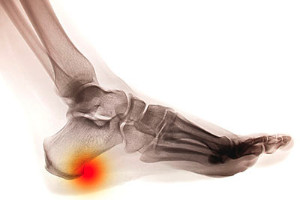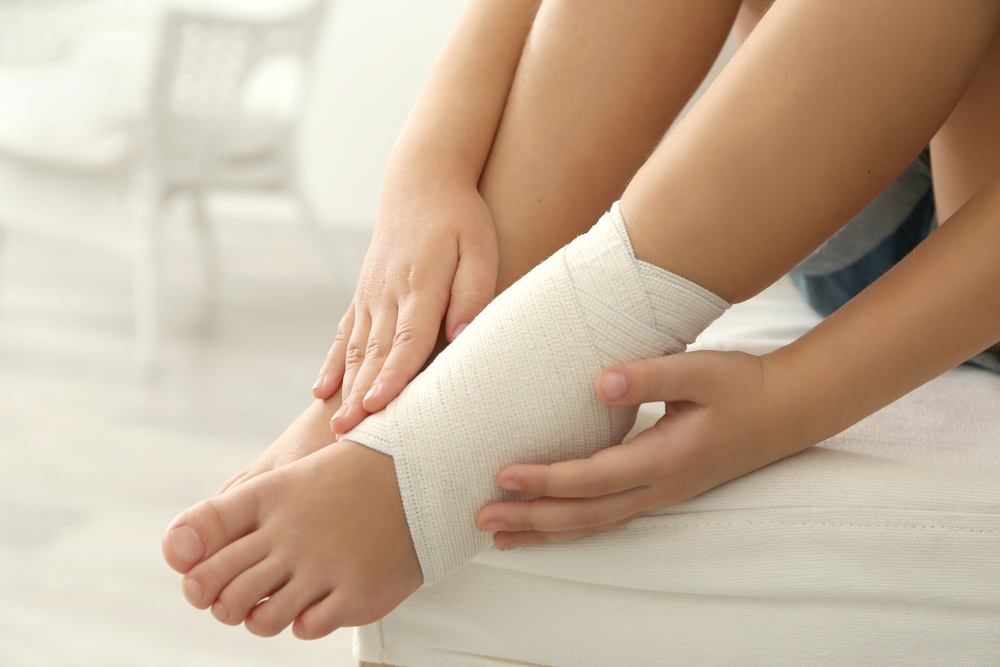Connect With Us
Blog
Items filtered by date: September 2018
Wounds That Don't Heal Need to Be Checked
Heel Spurs May Develop in Different Parts of the Foot
 A small bony protrusion that forms on the bone of the heel is often referred to as a heel spur. It may be located at the back of the heel or underneath it, and may produce severe pain and discomfort. The Achilles tendon may be affected if this condition forms at the back of the heel and as a result, pain may be felt while walking or running. If the spur develops on the bottom of the foot, it may be near the plantar fascia, and a condition known as plantar fasciitis may develop. This will often inflame this band of tissue that connects the foot to the heel, and patients who have this ailment may often experience severe pain in the sole of the foot. A proper diagnosis may include having an X-ray performed, followed by possibly choosing shoes with a cushioned sole, which may help to relieve pain that may originate from the inflammation. It’s important to confer with a podiatrist to learn what the best treatment options are for you.
A small bony protrusion that forms on the bone of the heel is often referred to as a heel spur. It may be located at the back of the heel or underneath it, and may produce severe pain and discomfort. The Achilles tendon may be affected if this condition forms at the back of the heel and as a result, pain may be felt while walking or running. If the spur develops on the bottom of the foot, it may be near the plantar fascia, and a condition known as plantar fasciitis may develop. This will often inflame this band of tissue that connects the foot to the heel, and patients who have this ailment may often experience severe pain in the sole of the foot. A proper diagnosis may include having an X-ray performed, followed by possibly choosing shoes with a cushioned sole, which may help to relieve pain that may originate from the inflammation. It’s important to confer with a podiatrist to learn what the best treatment options are for you.
Heel spurs can be incredibly painful and sometimes may make you unable to participate in physical activities. To get medical care for your heel spurs, contact Dr. Nicholas Przystawski from Central Florida Foot Care, PA. Our doctor will do everything possible to treat your condition.
Heels Spurs
Heel spurs are formed by calcium deposits on the back of the foot where the heel is. This can also be caused by small fragments of bone breaking off one section of the foot, attaching onto the back of the foot. Heel spurs can also be bone growth on the back of the foot and may grow in the direction of the arch of the foot.
Older individuals usually suffer from heel spurs and pain sometimes intensifies with age. One of the main condition's spurs are related to is plantar fasciitis.
Pain
The pain associated with spurs is often because of weight placed on the feet. When someone is walking, their entire weight is concentrated on the feet. Bone spurs then have the tendency to affect other bones and tissues around the foot. As the pain continues, the feet will become tender and sensitive over time.
Treatments
There are many ways to treat heel spurs. If one is suffering from heel spurs in conjunction with pain, there are several methods for healing. Medication, surgery, and herbal care are some options.
If you have any questions feel free to contact our office located in Leesburg, FL . We offer the latest in diagnostic and treatment technology to meet your needs.
Read more about How to Treat Heel SpursHow Elderly People Can Check Their Feet
 Many people who are elderly may develop uncomfortable foot conditions as they age. Research has shown there may be many reasons for this to occur. This may include a loss of cushioning in the skin and the nails losing moisture, which may become brittle. If you are contending with poor circulation, any sores that may be present may prove difficult to heal. People of all ages should check their feet regularly to look for cuts, blisters, or ingrown toenails. This is especially true of the older population who may experience difficulty in seeing clearly or bending down. Some patients find it helpful to use a mirror to see the bottom of their feet, or may ask a family member or friend for assistance. It’s important to have your feet measured frequently to ensure the correct size shoe is worn, in addition to wearing socks that fit snugly but are not too tight. If you find conditions such as ingrown toenails, bunions, or corns have developed, it’s suggested to speak with a podiatrist as quickly as possible for correct treatment.
Many people who are elderly may develop uncomfortable foot conditions as they age. Research has shown there may be many reasons for this to occur. This may include a loss of cushioning in the skin and the nails losing moisture, which may become brittle. If you are contending with poor circulation, any sores that may be present may prove difficult to heal. People of all ages should check their feet regularly to look for cuts, blisters, or ingrown toenails. This is especially true of the older population who may experience difficulty in seeing clearly or bending down. Some patients find it helpful to use a mirror to see the bottom of their feet, or may ask a family member or friend for assistance. It’s important to have your feet measured frequently to ensure the correct size shoe is worn, in addition to wearing socks that fit snugly but are not too tight. If you find conditions such as ingrown toenails, bunions, or corns have developed, it’s suggested to speak with a podiatrist as quickly as possible for correct treatment.
Proper foot care is something many older adults forget to consider. If you have any concerns about your feet and ankles, contact Dr. Nicholas Przystawski from Central Florida Foot Care, PA. Our doctor can provide the care you need to keep you pain-free and on your feet.
The Elderly and Their Feet
As we age we start to notice many changes in our body, but the elder population may not notice them right away. Medical conditions may prevent the elderly to take notice of their foot health right away. Poor vision is a lead contributor to not taking action for the elderly.
Common Conditions
- Neuropathy – can reduce feeling in the feet and can hide many life-threatening medical conditions.
- Reduced flexibility – prevents the ability of proper toenail trimming, and foot cleaning. If left untreated, it may lead to further medical issues.
- Foot sores – amongst the older population can be serious before they are discovered. Some of the problematic conditions they may face are:
- Gouging toenails affecting nearby toe
- Shoes that don’t fit properly
- Pressure sores
- Loss of circulation in legs & feet
- Edema & swelling of feet and ankles
Susceptible Infections
Diabetes and poor circulation can cause general loss of sensitivity over the years, turning a simple cut into a serious issue.
If you have any questions please feel free to contact our office located in Leesburg, FL . We offer the newest diagnostic and treatment technologies for all your foot and ankle needs.
Read more about Taking Care of Elderly FeetIt's Time for Beautiful Feet
Foot Ailments that May Occur During Pregnancy
 Pregnant women often experience foot conditions that may be a result of the changes the feet endure, which may be due to the additional weight. Foot pain is a common symptom, and this may occur the majority of the time, as a result of the feet becoming flat. Additional common symptoms that may affect the feet can include extreme swelling, which may also be referred to as edema, ingrown toenails, and cracked heels. The latter often occurs as a result of the additional weight, which may cause the feet to lose elasticity. The skin may become dry, and cracks may form, which is often uncomfortable and painful. Research has shown there may be preventative measures that can be implemented, which may help the feet to feel better. These may include elevating the feet as frequently during the day as possible, incorporating a gentle exercise program, and drinking plenty of fresh water as often as possible. If you are experiencing specific foot conditions, it’s helpful to consult with a podiatrist who can properly treat any foot condition you may have.
Pregnant women often experience foot conditions that may be a result of the changes the feet endure, which may be due to the additional weight. Foot pain is a common symptom, and this may occur the majority of the time, as a result of the feet becoming flat. Additional common symptoms that may affect the feet can include extreme swelling, which may also be referred to as edema, ingrown toenails, and cracked heels. The latter often occurs as a result of the additional weight, which may cause the feet to lose elasticity. The skin may become dry, and cracks may form, which is often uncomfortable and painful. Research has shown there may be preventative measures that can be implemented, which may help the feet to feel better. These may include elevating the feet as frequently during the day as possible, incorporating a gentle exercise program, and drinking plenty of fresh water as often as possible. If you are experiencing specific foot conditions, it’s helpful to consult with a podiatrist who can properly treat any foot condition you may have.
Pregnant women with swollen feet can be treated with a variety of different methods that are readily available. For more information about other cures for swollen feet during pregnancy, consult with Dr. Nicholas Przystawski from Central Florida Foot Care, PA. Our doctor will attend to all of your foot and ankle needs.
What Foot Problems Can Arise During Pregnancy?
One problem that can occur is overpronation, which occurs when the arch of the foot flattens and tends to roll inward. This can cause pain and discomfort in your heels while you’re walking or even just standing up, trying to support your baby.
Another problem is edema, or swelling in the extremities. This often affects the feet during pregnancy but tends to occur in the later stages.
How Can I Keep My Feet Healthy During Pregnancy?
- Wearing orthotics can provide extra support for the feet and help distribute weight evenly
- Minimize the amount of time spent walking barefoot
- Wear shoes with good arch support
- Wear shoes that allow for good circulation to the feet
- Elevate feet if you experience swelling
- Massage your feet
- Get regular, light exercise, such as walking, to promote blood circulation to the feet
If you have any questions please feel free to contact our office located in Leesburg, FL . We offer the newest diagnostic and treatment technologies for all your foot and ankle needs.
Read more about Pregnancy and Foot HealthSymptoms of a Sprained Ankle
 One of the most common injuries the feet can endure may be an ankle sprain. Although this may be a common occurrence among athletes, many people will experience this condition as a result of everyday activities. It happens when the ankle twists unnaturally, and the ligaments and tendons in the foot endure enormous stress. There are several symptoms that are indicative of a sprained ankle including severe pain and discomfort, swelling, and bruising. Some of the more typical reasons why an individual may sprain their ankle may include stepping off a curb that was out of sight, or stepping down with excessive pressure while running. If you feel you have injured your ankle that may have resulted in a sprain, please schedule a consultation with a podiatrist for proper treatment.
One of the most common injuries the feet can endure may be an ankle sprain. Although this may be a common occurrence among athletes, many people will experience this condition as a result of everyday activities. It happens when the ankle twists unnaturally, and the ligaments and tendons in the foot endure enormous stress. There are several symptoms that are indicative of a sprained ankle including severe pain and discomfort, swelling, and bruising. Some of the more typical reasons why an individual may sprain their ankle may include stepping off a curb that was out of sight, or stepping down with excessive pressure while running. If you feel you have injured your ankle that may have resulted in a sprain, please schedule a consultation with a podiatrist for proper treatment.
Although ankle sprains are common, they aren’t always minor injuries. If you need your ankle injury looked at, contact Dr. Nicholas Przystawski from Central Florida Foot Care, PA. Our doctor can provide the care you need to keep you pain-free and on your feet.
How Does an Ankle Sprain Occur?
Ankle sprains are the result of a tear in the ligaments within the ankle. These injuries may happen when you make a rapid shifting movement while your foot is planted. A less common way to sprain your ankle is when your ankle rolls inward while your foot turns outward.
What Are the Symptoms?
- Pain at the sight of the tear
- Bruising/Swelling
- Ankle area is tender to touch
- In severe cases, may hear/feel something tear
- Skin discoloration
Preventing a Sprain
- Wearing appropriate shoes for the occasion
- Stretching before exercises and sports
- Knowing your limits
Treatment of a Sprain
In many cases, the RICE method (Rest, Ice, Compression, and Elevate) is used to treat ankle sprains. However, you should see a podiatrist to see which treatment option would work best with your injury. In severe cases, surgery may be required.
It is important to ask your doctor about rehab options after you receive treatment for your injury. Stretching, strength training, and balance exercises may help the ankle heal while also preventing further injury.
If you have any questions, please feel free to contact our office located in Leesburg, FL . We offer the newest diagnostic and treatment technologies for all your foot care needs.
Read more about Ankle Sprains

